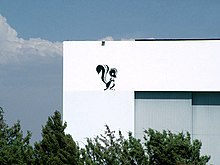Skunkworks project
| Look up skunkworks in Wiktionary, the free dictionary. |
A skunkworks project is a project developed by a relatively small and loosely structured group of people who research and develop a project primarily for the sake of radical innovation.[1] The term originated with Lockheed's World War II Skunk Works project.
Definition[]

Everett Rogers defined skunkworks as an "enriched environment that is intended to help a small group of individuals design a new idea by escaping routine organizational procedures."[2]
The term originated during World War II when the P-80 Shooting Star was designed by Lockheed’s Advanced Development Projects Division in Burbank, California, under similar circumstances. A closely guarded incubator was set up in a circus tent next to a plastics factory in Burbank. The strong smells that wafted into the tent made the Lockheed R&D workers think of the foul-smelling “Skonk Works” factory in Al Capp’s Li'l Abner comic strip.[3]
Since its origination with Skunk Works, the term was generalized to apply to similar high-priority R&D projects at other large organizations which feature a small elite team removed from the normal working environment and given freedom from management constraints.[3]
The term typically refers to technology projects developed in semi-secrecy, such as Google X Lab.[4][5] Other famous skunkworks were Microsoft Research, special teams at Boeing, and the lab of about 50 people established by Steve Jobs to develop the Macintosh computer, located behind the Good Earth Restaurant in Cupertino.[2]
Evolution of the idea[]
The Economist notes that the expectations for the products developed by skunkworks have changed in the 21st century from "something that makes their competitors say 'Wow'" to "something that makes their competitors' customers say 'Wow'". Rather than sequestering skunkworks, the companies now tend to promote communication between them and marketing, design, and accounting departments.[3]
See also[]
- Bootlegging (business)
- Hacker (programmer subculture)
References[]
- ^ "Skunk works". The American Heritage Dictionary of the English Language, Fourth Edition. reference.com. Retrieved October 12, 2009.
- ^ a b Rogers E. (2003) Diffusion of Innovations, 5th ed., p. 109.
- ^ a b c "Idea: Skunkworks". The Economist. August 25, 2008. Retrieved 2013-03-19.
- ^ Stone, Brad (22 May 2013). "Inside Google's Secret Lab". BusinessWeek. Retrieved 13 February 2014.
- ^ Daft, Richard (2013). Management. Cengage Learning. p. 361. ISBN 9781285068657.
- Innovation
- Innovation economics
- Research and development
- Technological races